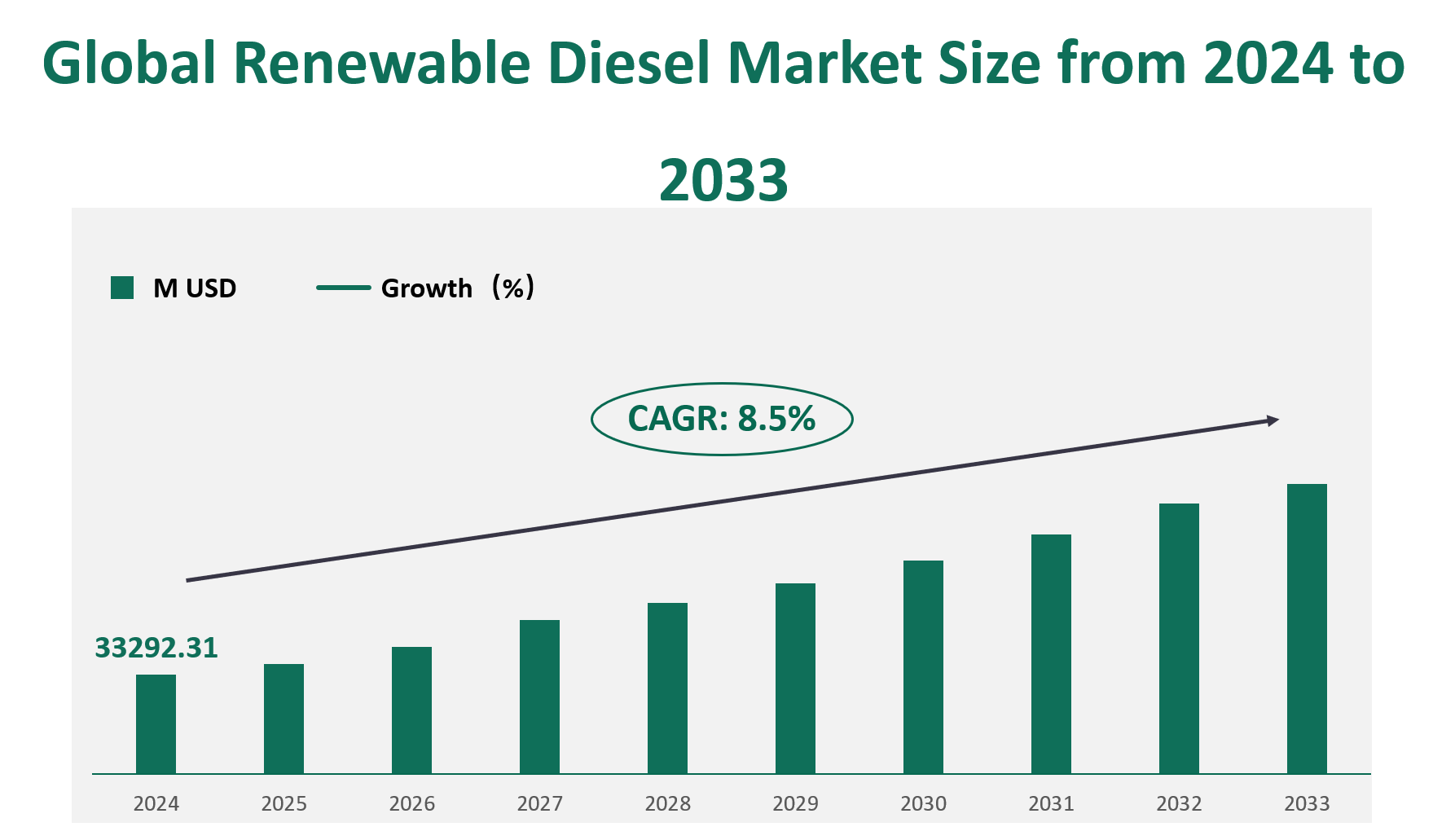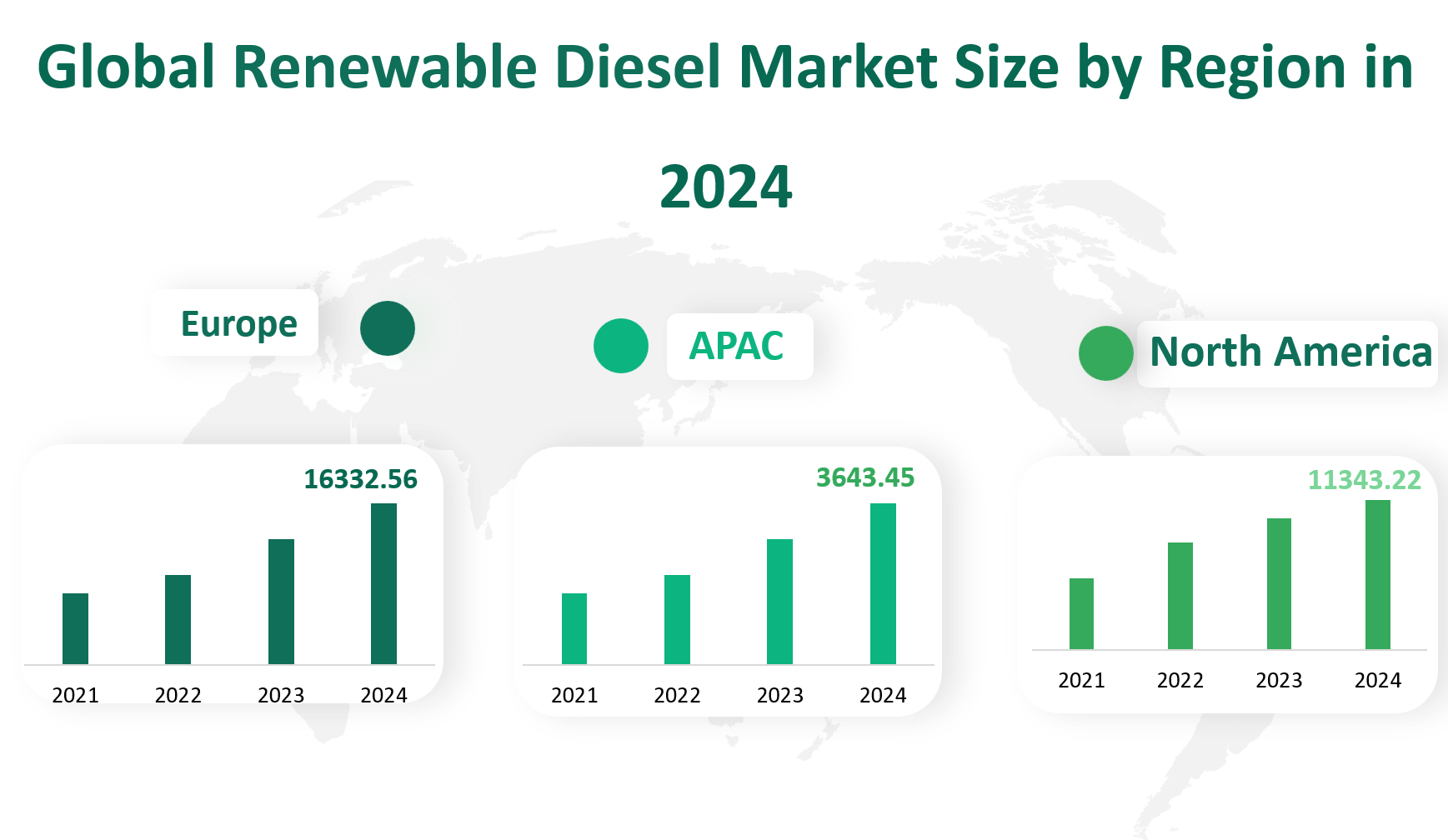1. Global Renewable Diesel Market Insight Analysis
The global Renewable Diesel market is projected to reach a value of $33,292.31 million (M USD) in 2024, with a Compound Annual Growth Rate (CAGR) of 8.5% over the next few years.
Renewable diesel is a next-generation biofuel that is chemically identical to petroleum diesel but is produced from renewable resources such as fats, vegetable oils, and cellulosic biomass. Unlike traditional biodiesel, renewable diesel undergoes a hydrotreating process, resulting in a fuel that meets the same ASTM specifications as petroleum diesel. This makes it a direct substitute for conventional diesel without requiring engine modifications.
Renewable diesel offers substantial environmental benefits, including reduced greenhouse gas emissions and improved air quality. It also has a lower sulfur content, making it a cleaner alternative to ultra-low sulfur diesel (ULSD). As sustainability goals and clean air regulations become more stringent, renewable diesel is poised to play a crucial role in the global energy transition.
Figure Global Renewable Diesel Market Size (M USD) and CAGR (2024-2033)

2. Driving and Limiting Factors of Renewable Diesel Market Growth
The growth of the renewable diesel market is propelled by several key drivers. Environmental benefits are a major factor, as renewable diesel significantly reduces greenhouse gas emissions compared to traditional diesel fuels.
According to the California Air Resources Board (CARB), renewable diesel can lower carbon intensity by 50% to 85%. Additionally, regulatory pressures are driving the expansion of renewable diesel production. Governments worldwide are implementing policies to support renewable fuels, such as the Renewable Fuel Standard (RFS) in the United States, which mandates the blending of renewable fuels into transportation fuel. These policies provide incentives such as tax credits and renewable identification numbers (RINs) to producers and blenders, further boosting market growth.
Raw material prices are a significant concern, as the demand for feedstocks like soybean oil and tallow has driven up costs. This has led to increased production expenses for renewable diesel manufacturers. Additionally, supply constraints are a major challenge. The rapid expansion of renewable diesel production capacity has outpaced the availability of raw materials, leading to potential shortages. For instance, by 2023, the demand for U.S. soybean oil could exceed domestic production by up to 8 billion pounds per year if proposed new capacity is built. These constraints could hinder the market’s ability to scale up production efficiently.
3. Technology Innovation and Corporate Mergers and Acquisitions in Renewable Diesel Market
Technological innovation is a cornerstone of the renewable diesel market’s growth. Hydrotreating technology is the most widely used method for producing renewable diesel. This process involves the hydrogenation of vegetable oils and fats, resulting in a fuel that is chemically identical to petroleum diesel. Companies are also exploring other advanced technologies, such as gasification and pyrolysis, to enhance production efficiency and reduce costs.
Additionally, refinery conversions are gaining traction, where existing petroleum refineries are being transformed into renewable diesel production units. This approach leverages existing infrastructure and reduces the need for new capital investments. For example, ENI’s Venetian refinery was converted to produce 300,000 tons of renewable diesel annually, while Total’s refinery in Lamede, France, was converted to a 500,000-ton facility.
Corporate mergers and acquisitions are also shaping the renewable diesel landscape. Companies are increasingly looking to expand their market share through strategic partnerships and acquisitions. For instance, Darling Ingredients, a leading provider of sustainable natural ingredients, has partnered with Valero Energy to develop renewable diesel production facilities. These collaborations aim to integrate the supply chain, from raw material sourcing to end-product distribution, thereby enhancing operational efficiency and market reach. Additionally, companies like Neste and World Energy are investing heavily in R&D to develop new feedstocks and production processes, further driving innovation in the sector.
4. Global Renewable Diesel Market Size by Type
Renewable diesel can be categorized into two primary types based on the feedstock and production process: Renewable Diesel from Lipids and Renewable Diesel from Cellulosic Biomass.
Renewable diesel from lipids is produced through the hydrotreating of fats, vegetable oils, and waste edible oils. This process results in a renewable fuel that is chemically identical to petroleum diesel and meets the same ASTM specifications. The feedstocks used include a variety of renewable resources such as tallow, used cooking oil, and other non-petroleum-based oils. The market value of renewable diesel from lipids is projected to reach approximately $6,551.93 million USD in 2024.
Renewable diesel from cellulosic biomass is produced from lignocellulosic materials such as crop residues, wood, and switchgrass. This type of renewable diesel complies with advanced biofuels under the Renewable Fuel Standard (RFS) program. The production process involves converting these biomass materials into renewable diesel through advanced technologies like gasification and Fischer-Tropsch synthesis. The market value of renewable diesel from cellulosic biomass is forecasted to be $26,740.38 million USD in 2024.
Table Global Renewable Diesel Market Size by Type in 2024
5. Global Renewable Diesel Market Size by Application
Locomotives are railway vehicles that power trains, traditionally pulling the train from the front. Renewable diesel in locomotives offers a cleaner alternative to traditional diesel, reducing emissions and improving air quality. The market value for locomotives application is projected to be $2656.73 million USD in 2024. In 2024, locomotives are expected to account for 7.98% of the total renewable diesel market value.
Ships are large watercraft used for transporting goods or passengers across oceans and other waterways. Renewable diesel for ships helps reduce sulfur emissions and meets international maritime environmental standards. The market value for ships application is forecasted to be $4,987.19 million USD in 2024. Ships are expected to hold 15.00% of the total renewable diesel market value in 2024.
Power plants generate electricity using various fuels, including renewable diesel. Renewable diesel in power plants can significantly reduce greenhouse gas emissions compared to traditional fossil fuels. The market value for power plants application is projected to be $6,641.82 million USD in 2024. Power plants are expected to account for 20.00% of the total renewable diesel market value in 2024.
Trucks are motor vehicles designed to transport cargo and perform other utilitarian tasks. Renewable diesel for trucks offers a sustainable alternative to traditional diesel, reducing emissions and improving fuel efficiency. The market value for trucks application is forecasted to be $17,884.63 million USD in 2024. Trucks are expected to hold the largest market share, accounting for 53.72% of the total renewable diesel market value in 2024.
Table Global Renewable Diesel Market Size by Application in 2024
Application | Market Size (M USD) 2024 |
Locomotive | 2656.73 |
Ships | 4987.19 |
Power Plant | 6641.82 |
Truck | 17884.63 |
Others | 1121.95 |
6. Global Renewable Diesel Market by Top Regions
North America is a significant market for renewable diesel, with a forecasted market value of $11,343.22 million USD in 2024. The region’s market share stands at 34.07%, driven by stringent environmental regulations and government incentives that promote the use of renewable fuels. North America is home to several major players in the renewable diesel industry, contributing to its substantial market share.
Europe remains the largest market for renewable diesel, with a forecasted market value of $16,332.56 million USD in 2024. The region’s market share is 49.06%, supported by strong regulatory frameworks and high demand for sustainable fuels. Europe’s commitment to reducing carbon emissions has led to significant investments in renewable diesel production and infrastructure.
The Asia Pacific region is the fastest-growing market for renewable diesel, with a forecasted market value of $3,643.45 million USD in 2024. The region’s market share is 10.94%, driven by increasing industrialization and a growing focus on sustainable energy solutions.
South America is experiencing steady growth in the renewable diesel market, with a forecasted market value of $1,101.03 million USD in 2024. The region’s market share is 3.31%, driven by increasing demand for cleaner fuels and government support for renewable energy initiatives.
The Middle East and Africa region is also witnessing growth in the renewable diesel market, with a forecasted market value of $872.05 million USD in 2024.
Figure Global Renewable Diesel Market Size by Region in 2024

7. Global Renewable Diesel Market Analysis by Major Players
7.1 Neste
Introduction and Business Overview: Neste is a leading global provider of renewable diesel, headquartered in Finland. Established in 1948, Neste has a strong presence in the transportation, aviation, polymers, and chemicals sectors. The company is renowned for its sustainable solutions, particularly in the production of renewable diesel and renewable jet fuel from waste and residues.
Products: Neste MY Renewable Diesel™ is a flagship product, offering significant reductions in greenhouse gas emissions compared to fossil diesel. The fuel is suitable for all diesel engines without modification.
7.2 Valero
Introduction and Business Overview: Valero Energy, established in 1980 and headquartered in the United States, is a major international manufacturer and marketer of transportation fuels and petrochemical products. The company operates in refining, marketing, and bulk sales activities, producing a wide range of fuels, including renewable diesel.
Products: Valero’s renewable diesel is produced from recycled animal fats, used cooking oils, and inedible corn oil. The company’s low-carbon fuel solutions are designed to meet stringent environmental standards.
7.3 World Energy
Introduction and Business Overview: World Energy Alternatives, established in 1998 and headquartered in the United States, specializes in the manufacturing, distribution, and market development of biofuels. The company operates biodiesel manufacturing plants and produces high-quality renewable diesel.
Products: World Energy’s Renewable Diesel is a 100% sustainable fuel that can be used in all modern diesel engines without modification. The product is known for its high performance and environmental benefits.

